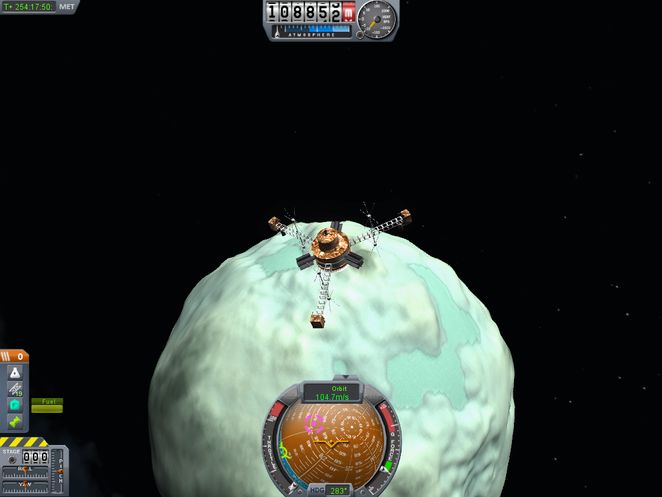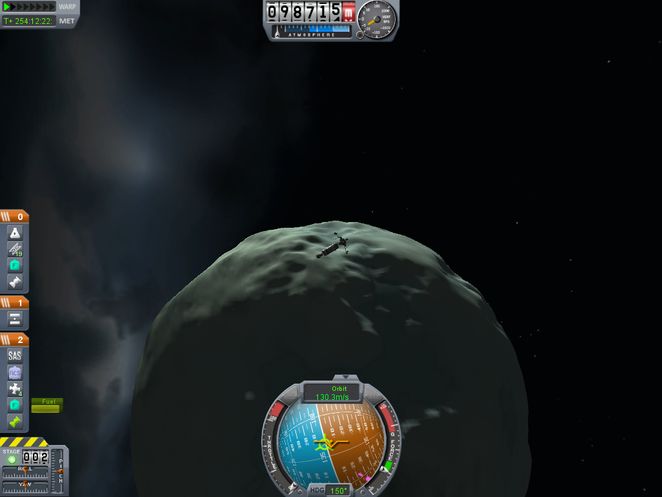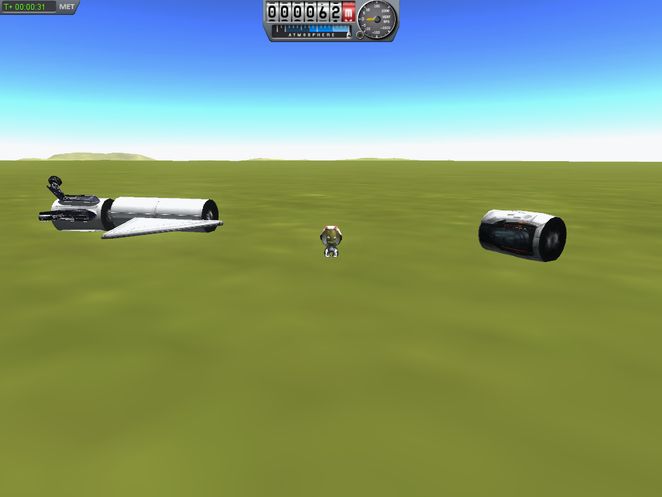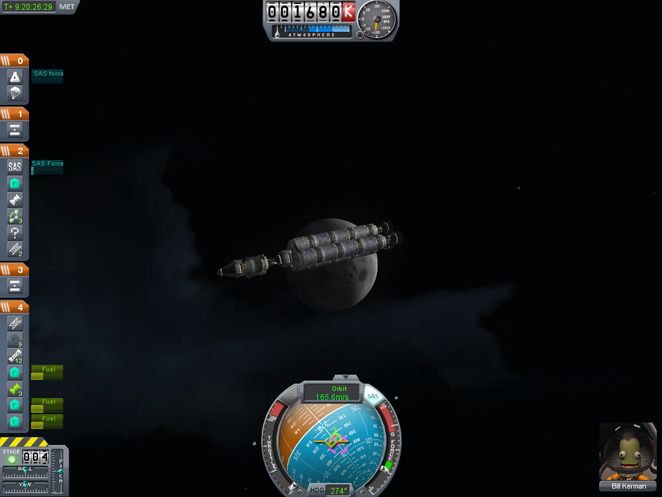

Carthaginian
-
Posts
104 -
Joined
-
Last visited
Content Type
Profiles
Forums
Developer Articles
KSP2 Release Notes
Bug Reports
Posts posted by Carthaginian
-
-
Does anyone else deliberately try to avoid using SRB's in their construction?
I feel that my Program is at its earliest, most basic stage of development... and that some tech should be off-limits.
Anyone else have those kinds of restrictions?
-
Well, if we're going to be that general, why not point out that all conflict falls into broad categories and is always boring? "Oh, it's another 'man vs. man' plot, followed by another 'man vs. nature' plot, followed by another 'man vs. self' plot, and finally, a 'man vs. society' plot. Can't they come up with anything original?"
Part of the problem, I think, is that we're not used to things having consequences for more than one episode for anything other than interpersonal conflict ("soap opera plots"). But it doesn't have to be that way. Conflicts are not frequently resolved quickly in the real world, and even whether or not they are resolved can be an open issue.
Consider Apollo 12 (the actual mission). They had a problem on launch (the rocket was struck by lightning twice during ascent), and they were unable to check whether or not the pyros that would open the parachutes were still in working order. They knew that when they brought the crew back, there was a chance that they would fall into communications blackout and never come out (hitting the ocean at high speed). That's kind of an extreme example, but it's the sort of thing that generates dramatic possibilities for more than one episode. But we're not used, as an audience, to having technical conflicts that have lasting effects. I disagree that keeping things realistic forces us into a repetitive corner.
(Of course, one can always say "And then what?" until creative ideas are exhausted, but I maintain that that's true for any genre; it's not a particular weakness of realistic science fiction.)
At the end of the day, my point is not to bash anyone's favorite sci-fi franchise. It's to point out how difficult this is, but that it's clearly not impossible (since examples do exist, and I'm always hoping someone has found more that I'm not aware of), and to bemoan the fact that there aren't more of them (to scratch my particular geeky itch -- my brain likes to be entertained, too, really).
First off- don't feel bad about bashing. I am a RABID Trek fan- but I'm also very quick to bash it.
Anything 'engineering-wise' in Star Trek is such a statistical improbability as to border on comedic. The aforementioned 'Heisenberg Compensator' is just one example of the blatant hand-wavium that takes place all the time. While the characters might be great and the stories can be excellent... honestly, the fact that they have to reinvent physics is annoying. The thing is that it works 'in-universe.' No matter how insane it seems to us, it is completely believable if you look at the universe the show takes place in and turn on your 'suspension of disbelief.'
The problem with a 'realistic' show versus a 'sci-fi' show is the same thing I experience all the time while watching something to do with the military, police work, or medicine. A 'realistic' show means that they cannot reasonably expect 'suspension of disbelief' regarding the subject matter. I watch NCIS- and though I find it entertaining, I always keep a mental list for the duration of the show that covers 1.) how many times each character should have been suspended/released/prosecuted for breaking procedure, 2.) how many times they completely BS the tech involved, like getting a DNA match over an in-show lunch break and 3.) how often they create some kind of romantic entanglement that real professionals would not allow to happen. You enjoy the characters, you like the stories- but you can never really get over the fact that it's utterly and totally unrealistic in it's 'realism'... just as 'fake' as any sci-fi show.
Any 'realistic' space show would be just as fake as a 'realisitc' cop show.
It wouldn't be any more 'real' than a sci-fi show; it would just be a completely different kind of untruth.
Additionally, it would run into the 'realism' problems that I pointed out earlier.
Not that I wouldn't necessarily watch it and like it- but it would get old a lot faster than a sci-fi show.
-
Lt. (J.G.) Neil Alden Armstrong- Rest.
You have truly earned it.
-
And don't forget about ST: The Motion Picture:
That's four different celestial bodies in the sky at the same time, one of which is way too big to be a moon.
Can't wait to see such a sight in KSP.
You gotta be old to remember that, Sordid.
They edited them out of later releases... said that the daytime sun would have been to bright to allowed them to be viewed.
Guess they never looked up at the sky when Luna is visible during the day.
-
Listening: The Pogues - The Band Played Waltzing Matilda
Celebrating my first safe landing in an atmospheric aircraft in KSP with Back Forty 'Truck Stop Honey.'
Perhaps if I hadn't had so many over the last few days, I would have landed more successfully on previous attempts.

-
Look up the "Picard Manoeuvre". Ignore any references to grabbing your jacket and pulling it down.

That, gents, is a dedicated Star Trek fan.
-
I respectfully disagree.
Part of what makes space travel exciting is that it is a *hazardous environment*. The dangers of space travel need not be limited to (a) radiation and (
 aliens with ray guns. The very fact that we need to rely on our cleverness and our technology to survive can be exciting in and of itself. It's not even the case that the *actual* space program was limited in problems to radiation, and our imaginations can come up with problems we never actually faced.
aliens with ray guns. The very fact that we need to rely on our cleverness and our technology to survive can be exciting in and of itself. It's not even the case that the *actual* space program was limited in problems to radiation, and our imaginations can come up with problems we never actually faced.Your other point -- that TV shows tend to keep running until the ratings falter -- is, I'd argue, a weakness in the way we do many TV shows here in the States; it imposes limitations on *any* drama, not just realistic science fiction. (And novelty is not exactly a cure-all, either. There are countless shows that introduced a new cast member when the ratings were relatively strong and promptly lost their faithful audience.)
The fact is that accurately representing circumstances that are quite far removed from everyday experience is *hard* (never mind bringing your audience up to speed). I suspect this keeps more TV producers out of the subject than the limitations in setting.
EDIT: Everything below came from a sudden flash of memory.
Consider "Planetes", which I mentioned at the start. It's about a group of orbital debris collectors, and they're based on a space station, but they still find room for a lot of variety -- different locations on the (somewhat large) space station, visiting family back at home, taking a vacation to an underground Moon colony... and one of the main characters ends up training for the first manned mission to the Jovian system, so there's the training facilities, the ship's drydock in orbit, and on and on. Just because the series features main characters employed by a more robust space program than any currently on the planet doesn't mean that they were stuck with "sit[ting] in the same spot with the same problems occurring over and over".
War is a 'hazardous environment'- in the end, it gets boring... both on TV and in real life. After the 200th convoy escort of the dozenth time you have to go kick in a door or drive through an unmarked minefield... well, the only thing you can think besides 'God, don't let me screw this up' is 'what, again?' That's why combat and cigarettes go so well together- they give you something to do while you are bored stiff waiting to be scared out of your wits again!

And while you are indeed right that it isn't literally the 'same problems' occurring over and over, the problems will be very expected and formulaic. Just like with a sci-fi drama they will fall into three major categories: 1.) problems from the environment, 2.) problems from inter-personal strife, and 3.) problems from equipment. Even if the actual thing going wrong varies from a solar flare, to an affair among the crew, to an oxygen generator failure... well, in the end, it winds up being the 'same thing going wrong.' When you are dealing with sci-fi shows, there are infinitely more things that can go wrong, in far more interesting environment, and at least the 'bug-eyed monster of the week' and 'undiscovered phenomena' can be added to the lists of potential problems.
No show that is truly realistic ever survives contact with a test audience.

-
I can't think of any near-future/current series involving space travel.
Honestly, a series set in that environment would be 'boring'- read: repetitive and uninteresting. There are only so many things that we can do with current technology: 1.) Earth-to-Orbit, 2.) Earth-to-Moon, and with some stretching* 3.) Earth-to-Mars. With #1 and #2 you run into the biggest problem of making an interesting 'present day' television series- situations I like to call the "Baa Baa Black Sheep Problem" (for #1) or the "Deep Space Nine Problem" (for #2).
The "Black Sheep Squadron Issue" I named for a series covering the misadventures of VMF-214 (The Black Sheep Squadron) during WWII. The actors were good, and the special effects were top-notch for the time period. The problem that killed the show was that there are only so many ways that you can shoot down a Zero, and there are only so many hooch-bars and nurses on one island in the South Pacific. Eventually, the show gets stuck in a rut and the audience will wander off to something less repetitive. Any 'Earth-to-Orbit' show will eventually hit this same wall- you can only launch a rocket into space so many times before it stops being interesting... heck, the actual Apollo program ran into the same issue!
Any 'Earth-to-Moon' show would hit the same sticking points as Star Trek: Deep Space Nine- namely, there's no place to go but where you are. You just sit in the same spot with the same problems occurring over and over. Sure, the locale is strange and interesting, and the problems are exciting and out of the ordinary... for the first season or so. Then you run into the same kind of repetition that any show with a fixed locale gets: your viewers get accustomed to the dangers and problems of this location and become inured- and your show gets boring. This is the very reason that DS9 had to add the Defiant to the 'cast of characters'; the ship gave them the ability to seek new problems other than what the show had already explored ad nauseum.
An 'Earth-to-Mars' show might make a good 'summer series' or 'mini-series' but would only turn into a 'soap opera in space' if you tried to hang on to it too long. You wind up with the 'M*A*S*H* Dilemma' where your show actually lasts longer than the event it portrays would! You would have to begin backtracking and doing 'prequel shows' and 'filler shows' just to try and make your third season. Then you get shows that are not in chronological order, or have flashback settings, or accidentally introduce continuity issues.
Right now, Science-Fiction is still the only really viable kind of space show- at least for something that's going to last a while.
*Biggest concern- radiation exposure. If people don't think its a problem, tell that to all the astronauts who had to have cataract surgery.
-
Saw some kind of Youtube vid and then came to the site.
-
Vulcan has no moons.
In the Diane Duane books (Spock's World, the Rihannsu series) and also, I think, in the Star Fleet Universe, Vulcan has not so much a moon as a nightmare.
Diane Duane calls the moon T'Khut; this name is also listed as a 'twin planet' in Memory Alpha (meaning it is canon). It is supposed to share an orbit with Vulcan and be tidally locked to Vulcan. Technically they are a 'double planet system' rather than a true 'planet/moon' pair- orbiting a common point rather than one orbiting the other.
This sounds something like what the devs are making for the 'Mars' planet.
-
Any word on the Mars-like planet's gravity/atmosphere?
The 'desert world' with a thin atmosphere and a near equally-sized moon sounds like one version of Vulcan in Star Trek.
-
Would a possible solution be (either officially of fan-made) a second tri-coupler style part that is set with the connection points reversed?
Instead of a 'Tri-coupler,' call it a 'Tri-reducer.'
Also, has anyone thought about making Quad-couplers, Sextuple-couplers and Octo-couplers?
And better still, bases for the double diameter fuel tanks allowing us to stack multiple smaller engines under them Soviet-style (like the 30 main engines of the N1)?
-
My first Minmus mission- a mapping satellite.

Minmus 1 crossing the terminator on its first active mission day.

Jeb yet again swearing painful vengeance upon the design team.

The beauty of overengineering... to Munar orbit in one stage.

-
pebble_garden,
First off, thank you for the vids!
On my first day, I killed so many Kerbals I lost count.
On my second day, I found your tutorial thread.
It is now my fifth day with (modded*) KSP and I have one failed lunar lander acting as a satellite and a purpose-built satellite around Minmus as of 5 minutes ago. Granted, the Minmus mission took almost an in-game year due to some sloppy burns and a poor insertion orbit, and wound up in a nearly polar orbit- BUT IT MADE IT TO ITS DESTINATION!!!
I can't wait till you can do a tutorial on adjusting orbital planes, so I get things in proper orbits.
Thank you for your excellent tools- you are a true boon to the community!
*no navigation tools- only some satellite parts mods.
-
If you can reproduce this bug, please file a bug report with as much info as possible incuding your dxdiag, output_log, and crash reports, your persistence files might help as well.
ROFFL - I reproduce it at least 4 times per game!
Reproducing it is precisely what I don't want to do!

Of course, if it will help, I'll turn in my information.
It happened to me to. What I did was open up Task Manager, right click on KSP and set the affinity on it to only use one processor. I don't know why it works, but I suspect it has to do with an imperfect utilization of multiple coresI'll give this a shot tonight when I play. I'm trying to make Minmus orbit after work- would be nice to be able to do it without reloading my game eleventy-dozen times.

-
Does anyone else have a problem with 1.6 'locking up' on them?
It happens to me multiple times a game.
I have the KSP in the c:games folder, and run from the quick-launch in Win7.
-
LOL... my only (successful) attempt at orbit- the 'One Way Trip' mission- is the only debris that orbits Kerb in my game.
After the five missions that failed to achieve orbit and wound up orbiting the sun, the KSPA got fed up and told the pilot (Jebidiah Kerbal) that this would likely be a one way trip. A few six-packs and a few cans of spraypaint later, Jeb's rocket bore the words in 6 foot high letters which were mostly legible. Of course, having resigned himself to fate, Jeb didn't really care about the letter of reprimand which he was saddled with on the day of the launch. Four hours and multiple orbits later, Jeb de-orbited due to contact with the atmosphere and splashed down successfully to the adoration of almost an entire planet... save one very angry CO.
-
Thanks gents, the right clicking thing worked like a charm...
Then the Kerbal Space Probe Association discovered another problem. They had been forced to use a lightweight (read: modded) satellite engine instead of a full-sized rocket propulsion unit, whether due to budget cuts or weight restraints is a source of lively debate (though most think that someone said 'oh... new and shiny' and strapped it on). This engine proved insufficient to slow the probe during simulated descents, and the landing had to be canceled anyway. The team was disappointed that they were unable to actually touch down on Mun, as the probe's mission of analyzing the Munar soil and measuring radiation at the surface will not be completed. They take solace, however, in the fact that they can still photograph the surface and use the probe to select a future landing site and also take radiation readings at altitude and hopefully use them to extrapolate surface data.
Thus Mun Beacon 1 will remain in a roughly 220,000 meter orbit (+/- 20k meters), inclined at roughly 45* to the orbital plane. Her rocket booster is still attached and has roughly 20% of its fuel supply, so it has not been separated. This is intended as an 'anti-pollution' measure; it will limit the amount of debris with which future missions must contend.
-
Ok, thanks to the AMAZING Pebblegarden 'To the Mun and Back' tutorial, I managed- on my second attempt no less- to get into Munar orbit!
 "Tango Mike" from a ex-groundpounder turned Kerbonaut!!!
"Tango Mike" from a ex-groundpounder turned Kerbonaut!!!The problem is that somewhere in the flight (and some rather frantic course correcting) I managed to get half my landing gear our of sync! Two go up, and two go down. I cannot seem to control them individually and I cannot manage to get them back in their original synced-up configuration. Is there any way for me to remedy this problem, or am I just going to have to write this one off as a 'hey, failures happen when the maintenance crew is 1,140,000 km's away!'
-
What a game!!!

You fire this thing up asking yourself "How hard can this be? I mean, you're shooting little green men into space on cartoon rocket ships!"
18 hours (and countless dead Kerbonauts) later, you're scouring the 'Net for how-to videos on how to achieve orbit, reading up on centers of gravity and control surfaces and downloading satellite mods so you don't feel bad about leaving the little :(s to asphyxiate or freeze to death! Your significant other begins to doubt your sanity as she heads off for bed while you triumphantly declare that you have now achieved a near-circular orbit and will soon conquer the stars! First Mun, then Minmus, THEN THE ENTIRE GALAXY (as soon as they get around to adding it)!
This is quite possibly the most addictive game I have played in a long time, and definitely the most addictive one for <$20! The modding community means that as soon as you download the game you're probably not going to be playing it stock, and that even if development stopped tomorrow this game would live for a long time.
So, I'm now off to read one of the many tutorials about how to run a Munshot, and to prep a heavy-lifter/satellite combo for a recon mission/practice run.


Strictly Liquidy...
in KSP1 Discussion
Posted
None of the early manned programs use SRB's as their launch vehicles.
All the rockets that I can remember being used were liquid fueled, and that makes me want to stick with them.
Also, though the Chinese used 'solid rocket motors'... well, the age of modern rocketry was ushered in by liquid engines.